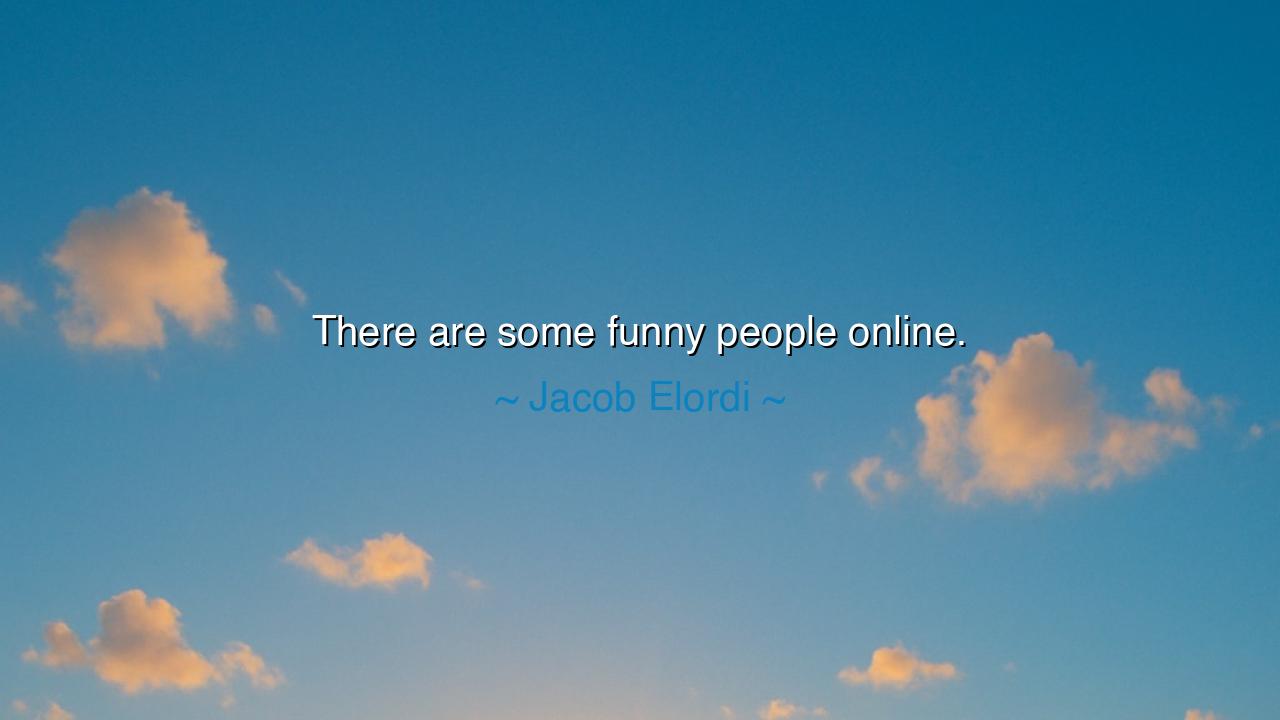
There are some funny people online.






Hear now, O wanderers of the digital age, the quiet yet piercing words of Jacob Elordi, who once said: “There are some funny people online.” Though simple in form, these words are no mere observation—they are a mirror held to our time, a reflection of how the spirit of humanity, with all its wit and wonder, now flows through the unseen threads of the world’s great web. For Elordi, an actor of intensity and grace, speaks not merely of laughter, but of connection—the strange and beautiful communion between strangers who meet not in temples or markets, but through the flicker of screens and the rhythm of words.
In the modern age, where the world’s voices echo through digital spaces, humor has become the common language of survival. When Elordi speaks of “funny people online,” he is acknowledging that in a time of division, distraction, and endless noise, humor still binds us together. It is the gentle rebellion of the human soul against the cold machinery of technology. It reminds us that even in the synthetic landscapes of the internet, the spark of human creativity burns bright. The laughter we find there is not hollow—it is proof that behind every username and profile lies a real heart, still capable of joy.
This truth is as old as civilization itself. In the courts of kings and the streets of Athens, it was the jesters and playwrights who dared to speak the truths others feared. Aristophanes made his city laugh at its own follies, teaching wisdom through mockery. The Roman poet Horace used satire to guide his society toward virtue. Today, these same spirits live on in memes, sketches, and quick words traded in the vast theater of the internet. Elordi’s words, though modern, echo the same timeless pattern: where power and pretense grow, laughter arises as a counterforce, balancing the world through humor’s sacred irreverence.
Yet beneath his remark lies a quiet marvel, even humility. “There are some funny people online,” he says, not as a performer praising himself, but as an admirer of others. In this, he reveals a deeper wisdom—that humor belongs to the people. It is democratic, untamed, and cannot be bought or staged. The funniest voices are often the unseen ones—the ordinary souls who turn their pain into play, their confusion into comedy. They are the philosophers of the present age, hiding in comment sections and videos, speaking truth through laughter, shaping culture with a wink and a grin.
Consider, for example, the story of Diogenes the Cynic, the philosopher who lived in a barrel and mocked the pomp of kings. When Alexander the Great visited him, asking if he could do anything for him, Diogenes replied, “Yes—stand out of my sunlight.” The crowd laughed, but in that laughter was revelation. Like the “funny people online” Elordi speaks of, Diogenes used wit to unmask vanity and restore perspective. His humor was both weapon and medicine—disarming arrogance, yet healing the human heart with the clarity of laughter.
Thus, Elordi’s observation becomes not trivial but profound. He reminds us that the internet, for all its darkness, still carries the voice of the eternal fool—the truth-teller hidden in laughter. Humor has always been a tool of survival, especially for the restless and misunderstood. It is the soul’s defense against despair, the spark that turns chaos into meaning. Those who are “funny online” are not merely entertainers; they are modern jesters and poets, teaching us that even in the noise and haste, humanity still laughs—and therefore, still lives.
From his words, let us draw a lesson: do not underestimate the power of laughter, nor the wisdom of those who wield it. Seek humor not as escape, but as understanding. When you laugh, ask yourself why—and you may find truth hidden behind the jest. When you encounter a “funny person online,” do not dismiss them as trivial; they may be, in their own way, philosophers of light. And if within you lies a spark of humor, share it freely—for laughter multiplies when given, and in giving it, you keep alive the oldest form of human connection.
So, my children of the glowing screens and endless scrolls, remember what Jacob Elordi has shown us in his simple words: that even amid algorithms and artifice, the human spirit endures. It laughs, it creates, it connects. There are, indeed, many “funny people online”—and through their laughter, they remind us that we are still, gloriously, alive.






AAdministratorAdministrator
Welcome, honored guests. Please leave a comment, we will respond soon